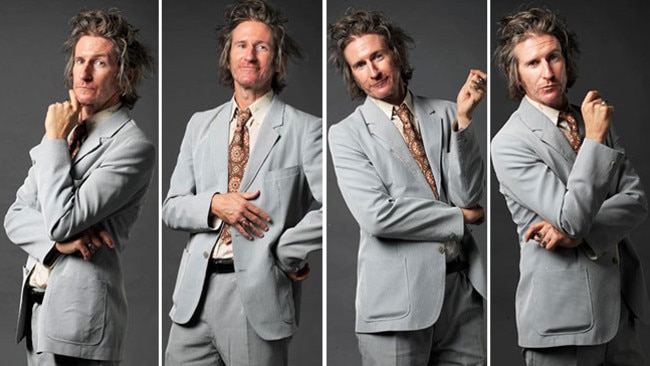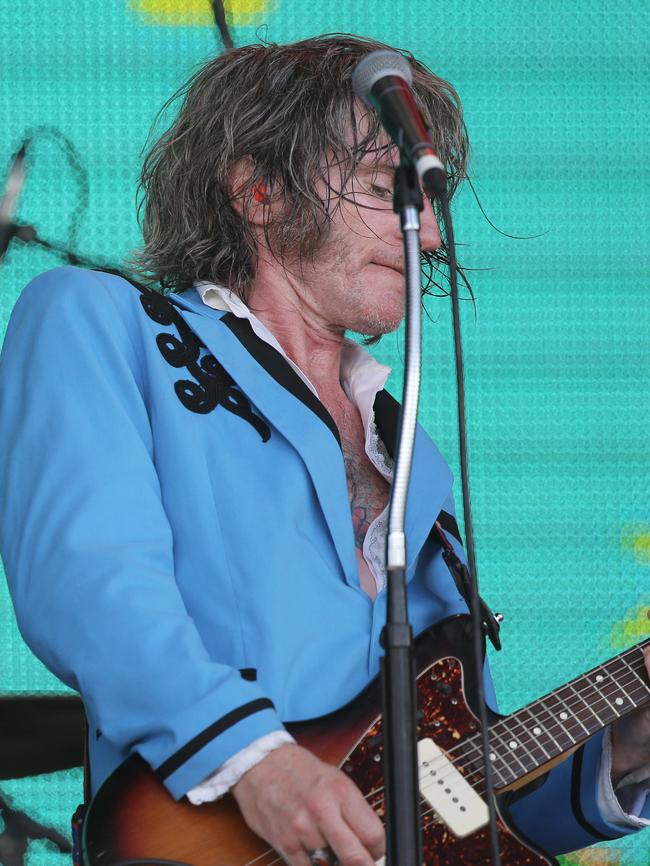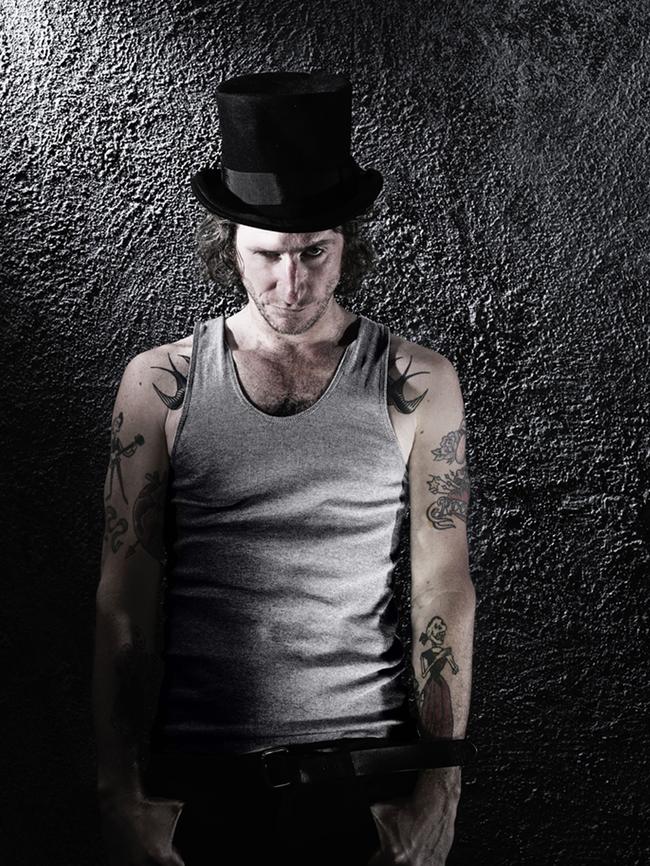Tim Rogers: older, wiser and with album An Actor Repairs
You Am I’s Tim Rogers is basking in a more mature outlook without denying his past.

On the surface it’s hard to imagine a better spokesman for a discussion panel titled The Male Monster from the Id than Tim Rogers. A singer with a reputation for consistently rewriting the rock ’n’ roll lifestyle manual, the You Am I frontman and musical multi-tasker is surely best placed to discuss the role of the male stereotype in all of its rock glory.
That’s why Rogers, 47, is on stage with fellow artist Adalita, once of Magic Dirt, American writer Holly George-Warren and moderator Bec Mac at A Rock & Roll Writers Festival in Brisbane, a two-day talkfest broader than its name suggests, to shed some light on what it is to be a rock star and on masculinity’s evolution within that domain.
But Rogers, an Australian rock icon whose reputation precedes him, isn’t here, this time, to shake his rock ’n’ roll tail-feather, to flash his torso or to spill testosterone over the mosh pit. He’s here to articulate, in an amusing, considered and charming fashion, that while he is still OK with being a middle-aged enfant terrible when the mood takes him, there is another Tim Rogers beneath that veneer, a troubadour taking stock of it all, a man who has moved on.
“I wanted to express that I have more interesting things going on,” Rogers says afterwards, nursing a cup of tea at his nearby hotel. Yes, tea.

Rogers, whose career has spread into film, theatre, television and radio since his band You Am I took Oz rock by the scruff of the neck in the 1990s, has long been seen as an Aussie torchbearer for the archetypal male rock singer tradition, a frontman carved from the same mould as Bon Scott, Jimmy Barnes, Chris Bailey, Doc Neeson and even the original wild one, Johnny O’Keefe. In so doing there have been periods when drugs and alcohol have been Rogers’s friends as well as his enemies, indulgences that have contributed to his glamorous rock ’n’ roll image as well as his undoing. And now, as he prepares to release a new solo album, An Actor Repairs, in a few weeks and a semi-autobiographical book later this year, the singer is growing up in public.
“I want to enjoy getting older,” he says. “I’m only 47. I’m not over any kind of hill yet. I just want to be a decent person.”
The latest manifestation of the Rogers oeuvre, An Actor Repairs is an example of the singer’s current reflective state. Originally designed as a stage musical, this stripped-back affair is written through the prism of an actor’s final bow, but in songs such as The Bug, One More Late Night Conversation and Youth there’s also a theme of letting go of the past.
“That was the original idea,” Rogers says of the musical theatre project, “but I was just trying to show off. I didn’t really want to write a stage show. It intrigues me, but I really had no stomach for roundtable conversations with dramaturges and actors.” The word “actor” is given extra emphasis, an ironic wink, perhaps, to his own credentials in that capacity.
Aside from his musical prowess as a solo artist and as You Am I frontman, as well as numerous singing collaborations with, among others, the Bamboos, the Hillbilly Killers and Tex Perkins, Rogers has been no stranger to the stage and screen as an actor. His credits in film include Jane Campion’s Holy Smoke and Michael Kantor’s The Boy Castaways, alongside Megan Washington. Kantor also directed him in Melbourne in the Malthouse Theatre’s production of Georg Buchner’s play Woyzeck in 2009, in which he played The Entertainer. He also appeared, albeit as himself, in the stage musical based on his album What Rhymes with Cars and Girls. Being at the command of a script is not his ideal endeavour.

“I don’t have a lot of discipline performing,” Rogers says. “Sticking to scripts and sticking to character are difficult. I hadn’t had stage fright in a decade and then when I did Cars and Girls last year I needed to be stationary for an hour and a half and I needed to hit marks. The discipline scared the shit out of me. It was terrifying.
“Actors are interesting characters,” he says. “I can say that because I’ve been told that I can’t act. There’s an intimacy in doing film. You’re incredibly intimate with people for a certain period of time ... and then you go. Running into people that you worked with is like running into an ex-lover.”
Bumping into old flames might be more of an occupational hazard to Rogers than to some of his contemporaries, but there are parts of his history as a rocker, as a bon vivant and as a man wrestling untold demons that have been much more confronting.
Back in You Am I’s heyday, after the albums Hi Fi Way (1995) and Hourly, Daily (1996) had garnered numerous awards and thrust the band towards international acclaim, Rogers was, by his own admission, in a bad way. He credits his bandmates and in particular You Am I bassist Andy Kent, who is now also the group’s manager as well as managing Rogers, for helping him through the hardest times.
“It’s good being managed by someone who has seen you at your worst,” says Rogers. And by worst he means suicidal.
■ ■ ■
Rogers, born in Kalgoorlie in Western Australia and raised in Perth, Adelaide and Sydney, featured in several early line-ups of You Am I from 1989 onwards, before the Sydney trio of Kent, Rogers and drummer Mark Tunaley released their debut album, Sound as Ever, in 1993. Tunaley was replaced by Rusty Hopkinson for Hi Fi Way and remains the band’s drummer today.
You Am I’s reputation as a no-nonsense punk pop force was legendary by then and Rogers was the focal point and the attention-getter, the archetypal rock ’n’ roll bad boy that he felt he wanted to be, but he was also burning the candle at both ends, something that was destined to catch up with him eventually — and it did.
“I made a very misguided faux suicide attempt in Toronto in 1997,” he says. “It was a cry for attention from an idiot, but I lacerated myself to such a degree that I had to be taken to hospital. Then I got driven back to the hotel. Andy and Russ’s way to handle it was to just crack open a beer and play video games. I couldn’t move my left arm because it was so cut up. We didn’t actually talk about it and we never have.”
That was not his lowest point, however. That came in the early 2000s, when his short marriage to Spanish philosophy teacher Rocio Garcia Rodriguez collapsed and the subsequent divorce and distance from their daughter Ruby when she moved with her overseas.
“I was very concerned about my daughter,” says Rogers. “That was the worst. I see photos of myself back then and I look horrible. I know why. From my perspective I don’t think I was horrible all those years ago, but I do get told a lot I was horrible, or ‘you’re not as horrible as you used to be’. I’m going to take that as a compliment. The music we were making wasn’t good and I was just angry. I was on a lot of prescription opiates. You don’t think you are that f..ked up ... ‘I can handle this, balance it all out’. There were lots of bad shows. There was lots of me not being accessible when people needed me. I was like that 24 hours a day. Whatever I do now, drinking or carrying on, I’ve got to be accessible.”
He credits his daughter, who is now 16 and living with her mother in New York, as the main reason for his sense of responsibility.
“I’ve learned a lot in the past couple of years,” he says, “like trying to care for a teenager.”
These days Rogers and his band colleagues, who since 1999 have included guitar guru Davey Lane, have a calmer, more mature take on rock ’n’ roll and their place in it. Rogers smarts a little at the idea that You Am I are no longer relevant, an estimation he says he found particularly hard to take when national youth broadcaster Triple J’s musical director Richard Kingsmill dubbed them a “90s band” whose most recent albums and singles didn’t fit into the station’s youth demographic playlist.
“At the time I thought the next time I see him I’m going to take him to task,” says Rogers, “but then I thought no, he’s right. I just hated being told by a guy I really like that I’m too old, regarded as a relic of the past. I’m not in his position, but maybe he’s right.”
They nevertheless remain a live drawcard, not least at festivals and on the heritage rock circuit, where they perform to thousands of devoted, loyal supporters.
“We’re still ambitious,” he says. “Those guys have incredible maturity and a lot of patience. They’re the kind of relationships that I try to atone for. They are smarter than me and their musical ideas are very astute, so I defer to them a lot of the time. We really do things just for kicks now and if there’s anything that is going to put a strain on our relationships with each other we just don’t do it. It’s a wonderful way to be.”
■ ■ ■
As an aside to the two days of debate at the writers festival, Rogers is performing in the ornate concert hall of the festival venue, Brisbane’s recently refurbished Old Museum. Joined by violinist and singer Xani Kolac, whom Rogers met when she was performing in the same production of Woyzeck eight years ago, it’s a perfect setting for the stripped-back songs and their poignant sentiments to hit home.
One of the songs, The Umpire’s Son, is a key to Rogers’s reflective mindset, a throwback to his childhood in Kalgoorlie, where the singer’s father was indeed a footy umpire.
“I hang on to the Kalgoorlie thing too tight,” he says, “but you have to hang on to something. I went out there a few years ago to see my dad and to write a story. I really hang on to that Kalgoorlie thing even though I was only there for seven or eight years. He said, ‘Well, it’s where we made our name.’ Maybe I’m just gleaning my dad’s experience and making it my own a bit. I have memories of following my dad around and going to the games and hearing the vitriol. Dad’s a big guy and was an excellent sportsman in his day and he had to cop it, and copped it with a lot of grace.”
In that song and the others on An Actor Repairs, Rogers is looking beyond the reality, past or present, looking for something deeper. And he thinks he’s found it.
“Someone said to me the other day: ‘you’re such a bloke, a footy-lovin’ beer-drinkin’ bloke’,” he says. “That’s true, but even with football it’s the aesthetics of it that I like. The blokey bit is the only thing about it that I don’t like. If it’s somehow exclusionary, I don’t like it.”
After the new album and a national tour, Rogers’s next project is the publication of his memoir, or what he loosely describes as a memoir. It’s a collection of essays about his life, 16 in all, more an observational recapping of events than a chronological retelling.
“I surprised myself by being able to do it,” he says. “I like that I could sit around in a seersucker suit and drink gin and tonics and write. I liked the work, although it was hard work. I didn’t think there was a story there, but doing what I do, I get a lot of chance to observe and people are honest with you. I might leave the country when it’s out, although I don’t think I’ll upset anyone. That wasn’t the intention.”
And there, perhaps, is a glimpse of the new Rogers, not denying his rock pig past, but basking in a more mature outlook that comes with the passing years.
“A large part of writing about an actor retiring, repairing,” he says, “was about feeling the first drag of age. I’d been noticing a lot of gentlemen my age hitting the gyms and going on special diets. I just thought, ‘I’m going to go the opposite way, let myself go.’
He hasn’t done that, although he bemoans having had to undergo two knee reconstructions in recent years, the result, he says, of a lifetime playing AFL and throwing himself around stages. Still, he’s in reasonably good shape for someone whose hedonistic approach to his art once knew no bounds. As he sings on the new song Youth: “Youth’s not wasted on the young, but it’s wasted on me.”
An Actor Repairs is released through Four Four/ABC/Universal on April 28. Tim Rogers begins a national tour in Wollongong tomorrow.



To join the conversation, please log in. Don't have an account? Register
Join the conversation, you are commenting as Logout